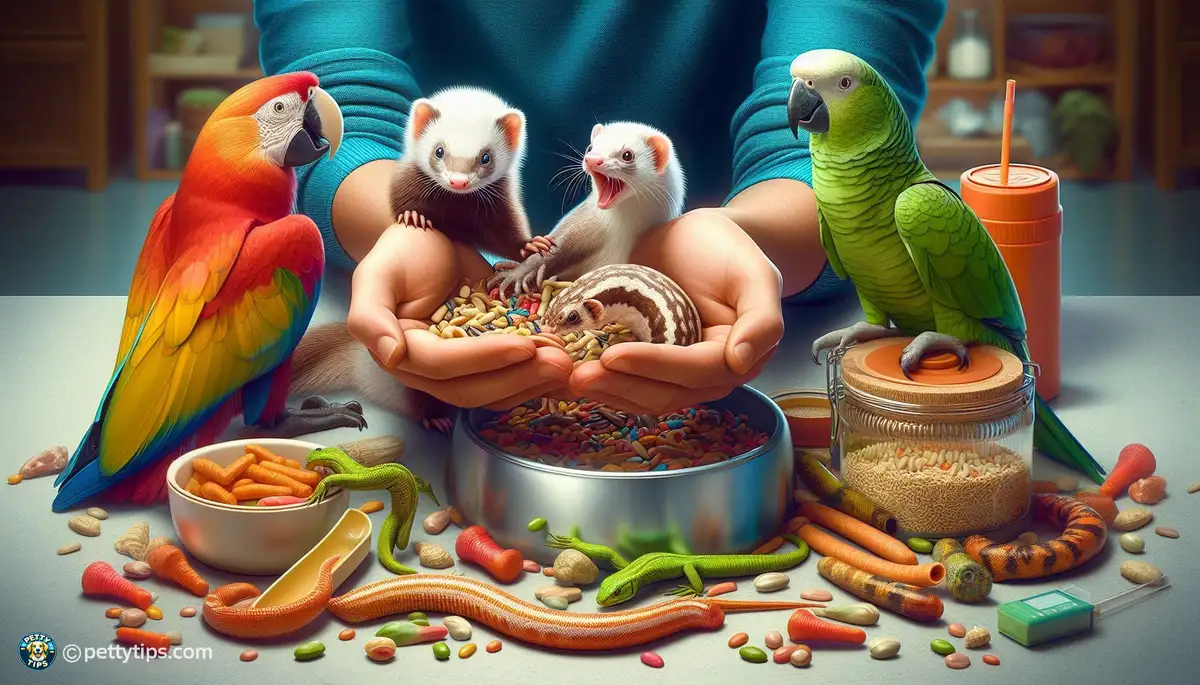- Home
- Exotic Pets
- Feeding Your Exotic Pet: Dos and Donts
Feeding Your Exotic Pet: Dos and Donts

Research Before You Buy
When it comes to exotic pets, it's crucial to do your homework before bringing one home. Each species has its own specific dietary requirements, and what works for one may not work for another. Take the time to research your chosen pet's natural habitat, feeding habits, and nutritional needs. This will help you make informed decisions when selecting food and feeding methods.
Consult with Experts
Seek advice from experienced exotic pet owners or consult with a veterinarian who specializes in exotic animals. They can provide valuable insights into your pet's dietary needs and offer recommendations on suitable food options. Additionally, consider joining online forums or communities dedicated to exotic pet care, where you can exchange tips and advice with fellow enthusiasts.
Avoid Generalizations
Avoid making assumptions about your exotic pet's dietary requirements based on similar species or common household pets. While certain foods may be suitable for dogs or cats, they could be harmful or inadequate for your exotic pet. Always prioritize species-specific nutrition to ensure your pet thrives in captivity.
Selecting the Right Food for Your Exotic Pet
Choose High-Quality Commercial Diets
Opt for commercial diets specifically formulated for your exotic pet species. These diets are often formulated to meet the nutritional needs of specific animals and may contain essential vitamins, minerals, and other nutrients. Look for reputable brands that prioritize quality ingredients and avoid fillers or artificial additives.
Incorporate Variety
Incorporating variety into your exotic pet's diet can help ensure they receive a wide range of nutrients. Offer a combination of commercially prepared foods, fresh fruits, vegetables, and occasional treats. However, be mindful of any dietary restrictions or preferences your pet may have, and introduce new foods gradually to prevent digestive upset.
Avoid Feeding Insects Caught in the Wild
While some exotic pets may naturally prey on insects in the wild, feeding them wild-caught insects can pose risks. Wild-caught insects may carry parasites, pesticides, or other harmful substances that could jeopardize your pet's health. Instead, opt for commercially bred insects specifically raised as feeder insects for exotic pets.
Establishing a Feeding Schedule and Routine
Consistency is Key
Establishing a consistent feeding schedule is essential for maintaining your exotic pet's health and well-being. Aim to feed your pet at the same times each day, taking into account their natural feeding patterns and preferences. Consistency helps regulate your pet's metabolism and prevents overeating or food-related stress.
Monitor Food Consumption
Keep track of your exotic pet's food intake and monitor their appetite and behavior. Sudden changes in appetite or eating habits could indicate underlying health issues or dietary deficiencies. Adjust your feeding routine accordingly and consult with a veterinarian if you have concerns about your pet's nutritional health.
Avoid Overfeeding
Overfeeding can lead to obesity and other health problems in exotic pets. Follow feeding guidelines provided by experts or veterinarians, and avoid overindulging your pet with treats or high-calorie foods. Use portion control and monitor your pet's weight to ensure they maintain a healthy body condition.
Ensuring Proper Hydration for Your Exotic Pet
Provide Fresh Water Daily
Always provide your exotic pet with access to fresh, clean water. Hydration is crucial for maintaining overall health and supporting bodily functions. Replace water bowls or containers daily to prevent bacterial growth or contamination, and ensure they are easily accessible to your pet.
Consider Hydration Sources in the Wild
Research your pet's natural habitat to understand their hydration needs and preferences. Some exotic pets may prefer to drink from shallow dishes or soak in water baths, while others may obtain moisture from their food sources. Mimicking their natural environment can encourage proper hydration and reduce stress.
Monitor Hydration Levels
Keep an eye on your exotic pet's hydration levels and behavior, as signs of dehydration can vary between species. Watch for symptoms such as sunken eyes, lethargy, or excessive panting, and take prompt action if you suspect your pet is dehydrated. Consult with a veterinarian for guidance on rehydration techniques and solutions.
Addressing Common Feeding Challenges and Concerns
Avoiding Nutritional Deficiencies
Nutritional deficiencies can arise if your exotic pet's diet is incomplete or unbalanced. To prevent deficiencies, ensure your pet's diet includes a variety of nutrients, vitamins, and minerals. Consider supplementation under the guidance of a veterinarian, especially for pets with specific dietary requirements or health conditions.
Handling Food Allergies and Sensitivities
Just like humans, exotic pets can develop food allergies or sensitivities that manifest as digestive issues, skin problems, or other symptoms. If you suspect your pet is allergic to certain foods, eliminate those items from their diet and observe any improvements in their health. Consult with a veterinarian for allergy testing and dietary recommendations.
Addressing Picky Eating Behavior
Some exotic pets may exhibit picky eating behavior, refusing certain foods or showing a preference for particular textures or flavors. Experiment with different food options and presentation methods to entice your pet's appetite, and be patient as they adjust to new foods. Avoid forcing your pet to eat, as this can lead to stress and aversion to feeding.
Conclusion: Prioritizing Your Exotic Pet's Nutritional Health
Feeding an exotic pet requires careful consideration of their unique dietary needs, preferences, and behaviors. By researching your pet's species-specific requirements, selecting high-quality foods, establishing a consistent feeding routine, and monitoring their hydration and nutritional intake, you can ensure they thrive in captivity. Remember to consult with experts and veterinarians for guidance tailored to your pet's individual needs, and prioritize their health and well-being above all else. With proper care and attention, you can provide your exotic pet with a balanced diet that supports their overall health and happiness.
